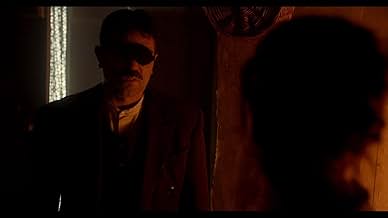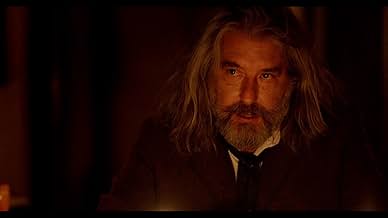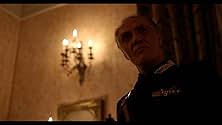IMDb RATING
4.4/10
1.7K
YOUR RATING
WWI has ended but events surrounding the first free election in Italy threaten to tear the village apart. Padre Pio struggles with his own personal demons, ultimately emerging to become one ... Read allWWI has ended but events surrounding the first free election in Italy threaten to tear the village apart. Padre Pio struggles with his own personal demons, ultimately emerging to become one of Catholicism's most venerated figures.WWI has ended but events surrounding the first free election in Italy threaten to tear the village apart. Padre Pio struggles with his own personal demons, ultimately emerging to become one of Catholicism's most venerated figures.
- Director
- Writers
- Stars
- Awards
- 1 win & 1 nomination total
- Director
- Writers
- All cast & crew
- Production, box office & more at IMDbPro
Featured reviews
The town parts, which is most of the movie, were just awful. Broken English, heavy accented English from everyone. Why not have them speaking Italian? It would have made it a lot better
But maybe only one star better. The town dialogue was boring and uninteresting and far from the way a regular person would speak. I did not care about any of the townspeople, they all could have died and I would have been happy to get back to the scenes of Pio which is the movie's topic.
I gave a star for Shia's performance as Padre Pio. Again the writing isn't there for it to be one of his best performances or anything, but it was the only enjoyable part of the movie.
I have a crazy idea why not put more Padre Pio scenes in a film about Padre Pio? Maybe they didn't think of that. Whole film could have been in the church instead and it would have been a solid 5/10.
But maybe only one star better. The town dialogue was boring and uninteresting and far from the way a regular person would speak. I did not care about any of the townspeople, they all could have died and I would have been happy to get back to the scenes of Pio which is the movie's topic.
I gave a star for Shia's performance as Padre Pio. Again the writing isn't there for it to be one of his best performances or anything, but it was the only enjoyable part of the movie.
I have a crazy idea why not put more Padre Pio scenes in a film about Padre Pio? Maybe they didn't think of that. Whole film could have been in the church instead and it would have been a solid 5/10.
Padre Pio is portrayed as being in a constant state of suffering. The last scene shows the stigmata and the entire movie seems to be leading up to that point. The film's purpose seems to be that the stigmata was real. Knowledge of Padre Pio is required before this movie will make any sense. Keep your finger on the volume dial for the whole movie. The sound is either so quiet that you have to turn it up to 70% and then there are points where it is so loud you have to turn it down to 20%. Most of the plot is boring and the nudity is unnecessary and precludes showing this film to a lot of people. In the movie, Padre Pio is disconnected from other people and I gather this movie will also not connect with many people either. Rent this film but do not buy it. It is an unpleasant, uninspiring movie. It does not draw people to faith.
Such a disappointment. Literally 20 minutes of the film contains Padre Pio. This movie focuses on political issues in Italy rather than Padre Pio. The film was boring & lacked any points of interest. Crew had no idea the talent in Shia LeBouf, who did a phenomenal job as Padre Pio. He wasn't given anywhere near enough screen time or enough opportunity to portray Padre Pio. Nudity in a film about the greatest saint of our time is so sacreligious & disrespectful to the man that is Padre Pio as well as his religion. This is an injustice to Padre Pio & such a bust. LeBouf was phenomenal, storyline was awful.
I've genuinely anticipated this movie, especially after the multiple pushbacks of the release date. I even saw the interviews LaBeouf has done about the sincerity behind his role as Padre Pio and conversion to Catholicism.
Unfortunately, the following of the political unfolding was very mundane and bare. And worse off, there was minimal tie between the current events to Padre Pio's influence on the people outside of maybe the Eucharist and a couple confessions.
I certainly can say every scene LaBeouf was in, he carried extremely well, but these were sparsely placed throughout the film, and felt very removed from the rest of the movie. However, these scenes still did have a depth and spiritual sense of sacredness that I wish pervaded more of the movie. The moments of his anguish and torment were compelling, but short lived, especially because they were juxtaposed against the aforementioned weakness of the exterior events.
When showing the forced labor the villagers were facing, the cinematography was very jagged and disorienting. I understand it was meant to instill a sense of anxiety and arduousness against the still, calm lensing of Pio's sanctuary, but it was so pronounced that it was just distracting and dizzying. I could get used to an Oliver Wood style of camera shake in an action movie, but it didn't work with this film.
There was little to no tension to the storyline to really illicit a yearn for resolution. Because of this, the film lacked emotional substance, and not stakes. I'm usually content with slower paced movies as long as there's still a sense of building tension.
Again, Shia's performance did stand out, but outside of that, I'm afraid to say this movie really did not carry the viewer through the depth and influence of Padre Pio. Not Shia's fault, more on the writers and director.
I think a better film around this monastic spiritual genre would be "Of Gods and Men."
Unfortunately, the following of the political unfolding was very mundane and bare. And worse off, there was minimal tie between the current events to Padre Pio's influence on the people outside of maybe the Eucharist and a couple confessions.
I certainly can say every scene LaBeouf was in, he carried extremely well, but these were sparsely placed throughout the film, and felt very removed from the rest of the movie. However, these scenes still did have a depth and spiritual sense of sacredness that I wish pervaded more of the movie. The moments of his anguish and torment were compelling, but short lived, especially because they were juxtaposed against the aforementioned weakness of the exterior events.
When showing the forced labor the villagers were facing, the cinematography was very jagged and disorienting. I understand it was meant to instill a sense of anxiety and arduousness against the still, calm lensing of Pio's sanctuary, but it was so pronounced that it was just distracting and dizzying. I could get used to an Oliver Wood style of camera shake in an action movie, but it didn't work with this film.
There was little to no tension to the storyline to really illicit a yearn for resolution. Because of this, the film lacked emotional substance, and not stakes. I'm usually content with slower paced movies as long as there's still a sense of building tension.
Again, Shia's performance did stand out, but outside of that, I'm afraid to say this movie really did not carry the viewer through the depth and influence of Padre Pio. Not Shia's fault, more on the writers and director.
I think a better film around this monastic spiritual genre would be "Of Gods and Men."
The First World War has just ended, but peace is far from the Italian village of San Giovanni Rotondo. As families welcome back their loved ones from the battlefield, a new conflict brews between the socialist peasants and their oppressive landowners. Meanwhile, in the village convent, Capuchin friar Padre Pio is having a crisis of faith. Encountering demons and suffering from vivid, dark hallucinations, will the friar overcome his troubles, and will the villagers find their freedom?
Directed by Abel Ferrara, 'Padre Pio' is a witless Frankenstein's monster: a strange, plodding drama that feels like two vastly different films spliced poorly together; neither of which are very good. Written by Ferrara and Maurizio Braucci- alongside whom Ferrara wrote the far more interesting 'Pasolini'- the film aims to explore themes of spirituality and politics in post-war Italy, but ends up saying nothing at all. The links between the story involving the villagers and the one concerning the titular character are tenuous and poorly explained, while the complete package is so slow and tedious it would be more worthwhile watching paint dry.
Moreover, the dialogue is stilted and cliched, with the villagers' arguments for and against socialism being especially trite and banal. Often, it sounds like bad improvisation- and the fact that the mostly Italian cast struggle to deliver their lines in English doesn't help matters. Additionally, although Ferrara tries to juxtapose the suffering of Pio with that of the villagers, it doesn't work, feeling ham-fisted at best. Furthermore, his portrayal of the friar isn't sympathetic, nor interesting, with no backstory or characterisation. There's no reason to root for him, and his dull journey towards stigmata simply isn't engaging.
Having said that, there are moments throughout that hold interest, even if they're too few and far between. An all-too-short scene involving a character confessing his lust for his daughter brims with an intriguing menace, while the opening sequence- in which soldiers return from the war- is well realized, with minimal dialogue. Unfortunately, scenes like those are rare gems in a sea of mediocrity, and the majority of the narrative is a slog.
On the other hand, Alessandro Abate's muted cinematography adds a dose of realism to proceedings, and is consistently striking. Tommaso Ortino's production design lends additional authenticity to the picture, while the set and costume design is of a particularly high quality. However, Joe Delia's score- incorporating, at one point, Southern chain-gang music- is overblown, lacking subtlety or power.
Shia La Beouf stars as the titular character, delivering a performance of staggering self-indulgence, going so over-the-top he makes Nicolas Cage in 'Vampire's Kiss' look like a masterpiece of understatement. It is a misjudged attempt to outdo Daniel Day-Lewis in the intensity department, making Padre Pio look petulant, insane and dour. His Italian co-stars all do more nuanced work, but the impact of their performances are severely hampered by their having to speak in English. Worth mentioning, however, is Asia Argento, who plays the incestuous father, injecting some much-needed energy into a lifeless film.
In conclusion, Abel Ferrara's 'Padre Pio' is a failure, both as a biopic of the titular character and as a drama concerning Italian socio-political history. Drab, dull and disappointing, the narrative lacks wit, insight and entertainment value, while the dialogue is consistently contrived and unnatural. While the cinematography and production design are commendable, the score is poor and the central performance from Shia LaBeouf is terribly over-the-top. In short, it's a boring waste of time, deserving Three Hail Marys, and nothing more.
Directed by Abel Ferrara, 'Padre Pio' is a witless Frankenstein's monster: a strange, plodding drama that feels like two vastly different films spliced poorly together; neither of which are very good. Written by Ferrara and Maurizio Braucci- alongside whom Ferrara wrote the far more interesting 'Pasolini'- the film aims to explore themes of spirituality and politics in post-war Italy, but ends up saying nothing at all. The links between the story involving the villagers and the one concerning the titular character are tenuous and poorly explained, while the complete package is so slow and tedious it would be more worthwhile watching paint dry.
Moreover, the dialogue is stilted and cliched, with the villagers' arguments for and against socialism being especially trite and banal. Often, it sounds like bad improvisation- and the fact that the mostly Italian cast struggle to deliver their lines in English doesn't help matters. Additionally, although Ferrara tries to juxtapose the suffering of Pio with that of the villagers, it doesn't work, feeling ham-fisted at best. Furthermore, his portrayal of the friar isn't sympathetic, nor interesting, with no backstory or characterisation. There's no reason to root for him, and his dull journey towards stigmata simply isn't engaging.
Having said that, there are moments throughout that hold interest, even if they're too few and far between. An all-too-short scene involving a character confessing his lust for his daughter brims with an intriguing menace, while the opening sequence- in which soldiers return from the war- is well realized, with minimal dialogue. Unfortunately, scenes like those are rare gems in a sea of mediocrity, and the majority of the narrative is a slog.
On the other hand, Alessandro Abate's muted cinematography adds a dose of realism to proceedings, and is consistently striking. Tommaso Ortino's production design lends additional authenticity to the picture, while the set and costume design is of a particularly high quality. However, Joe Delia's score- incorporating, at one point, Southern chain-gang music- is overblown, lacking subtlety or power.
Shia La Beouf stars as the titular character, delivering a performance of staggering self-indulgence, going so over-the-top he makes Nicolas Cage in 'Vampire's Kiss' look like a masterpiece of understatement. It is a misjudged attempt to outdo Daniel Day-Lewis in the intensity department, making Padre Pio look petulant, insane and dour. His Italian co-stars all do more nuanced work, but the impact of their performances are severely hampered by their having to speak in English. Worth mentioning, however, is Asia Argento, who plays the incestuous father, injecting some much-needed energy into a lifeless film.
In conclusion, Abel Ferrara's 'Padre Pio' is a failure, both as a biopic of the titular character and as a drama concerning Italian socio-political history. Drab, dull and disappointing, the narrative lacks wit, insight and entertainment value, while the dialogue is consistently contrived and unnatural. While the cinematography and production design are commendable, the score is poor and the central performance from Shia LaBeouf is terribly over-the-top. In short, it's a boring waste of time, deserving Three Hail Marys, and nothing more.
Did you know
- TriviaThe filming locations are places Padre Pio lived or visited.
- How long is Padre Pio?Powered by Alexa
Details
Box office
- Gross worldwide
- $12,100
- Runtime
- 1h 44m(104 min)
- Color
Contribute to this page
Suggest an edit or add missing content


























